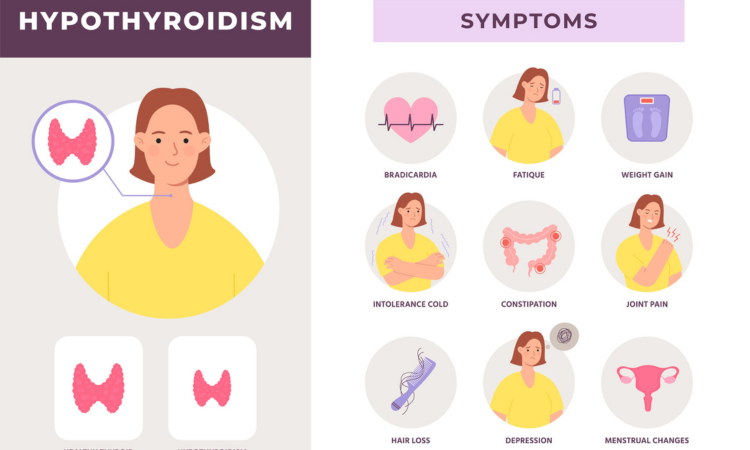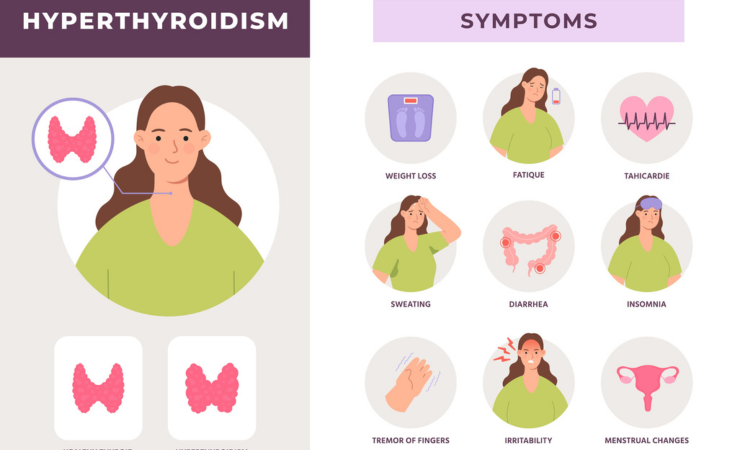Thyroid Health 101
May 25, 2023
January is Thyroid Awareness month and World Thyroid Day is May 25th. So, why does this relatively small gland have its own day and an entire month dedicated to awareness? It may come as a surprise to learn that something taking up such little space in our bodies can have such big impacts on our overall health and wellness. And having a greater awareness around the purpose and function of our thyroid can help us identify possible issues that may have negative effects in our daily lives - contributing to both acute and chronic health conditions.
What is the thyroid?
The thyroid is a two-inch long gland located in the lower, front part of the neck. There are two small lobes and it is shaped like a butterfly. It sits below the larynx (voicebox) and the middle section straddles over the trachea (windpipe). The thyroid is an important part of the endocrine system and produces two important hormones: Triiodothyronine (known as T3) and Thyroxine (known as T4). T3 and T4 are regulated by Thyroid Stimulating Hormone (TSH) released by the pituitary gland. The thyroid and pituitary glands function together by providing feedback to each other for proper regulation of T3 and T4. When the pituitary gland is functioning normally, it tells the thyroid to release more or less of these hormones based on the amount currently circulating in the blood. If the pituitary gland is not functioning properly, it could cause an imbalance in T3/T4; but irregularities are actually more commonly due to a thyroid issue (rather than a pituitary issue). A thyroid function test, performed in a lab with a blood sample, measures the levels of T3, T4, and TSH. It’s actually often included in routine blood work as part of your annual check-up or it can be specifically ordered if symptoms of imbalance arise outside of your normal checkup schedule.
What does the thyroid do?
The thyroid’s main function is to control the body’s metabolism. The term “metabolism” is often simplified - being only associated with how easily a person gains or loses weight; but its true purpose is much more complex than that. Our metabolic rate determines how well our cells perform their duties that are essential to life. When the thyroid isn’t producing enough of the necessary hormones (or producing them in incorrect amounts), our cells don’t have enough energy to function optimally. For example, if too many hormones are being produced, our cells use more energy faster than they should. Because these functions occur at and impact the cellular level, an imbalance in either direction can cause conditions most commonly known as hypothyroidism and hyperthyroidism. Genetics and family history, autoimmune disorders and medication side effects can all influence these conditions, but, beyond those similarities, the symptoms are widely varied. Let’s look at each in more detail below:

Hypothyroidism (also known as "underactive thyroid") is when lower than normal hormone production necessary for efficient cell function occurs. Common contributing factors may include the autoimmune disorder known as Hashimoto’s Disease, radiation exposure during cancer treatment, or a diet low in iodine. Symptoms may include:
- Muscle aches, cramps and weakness
- Joint swelling and stiffness
- Dry skin, brittle nail/hair, facial swelling
- Weight gain and constipation
- Depression and Forgetfulness
- Irregular or heavier than usual menstrual cycles
- Sensitivity to cold temperatures
- Hoarse voice or a persistent raspy cough

Hyperthyroidism (also known as "overactive thyroid") is when higher than normal hormone production necessary for efficient cell production occurs. Contributing factors may include the autoimmune disorder known as Graves’ Disease, viral infections, or a nodule that has formed on or in the thyroid gland. Symptoms may include:
- Heart disease, heart failure, and/or rapid heart rate
- Tremors or seizures
- Weight loss and more frequent bowel movements
- Sleeplessness or insomnia
- Bulging eyes and/or fullness at front of neck
Who is at risk for developing throid issues?
Thyroid problems can actually happen to anyone. There are, however, a few risk factors that may cause someone to be more susceptible than others. Having a sedentary lifestyle with little physical activity can contribute to an underactive thyroid. Females are at higher risk due to fluctuations between estrogen and progesterone; these fluctuations can cause an inflammatory response involving the thyroid. The shift in hormones both during and after pregnancy can also contribute to thyroid problems - even triggering an immune response after childbirth. The hormonal changes that occur during the transition into menopause may cause disruption in normal thyroid function as well. All of these events are related because they are also part of the endocrine system (our system that controls all the hormones of the body).
Cancer that originates in the thyroid gland is typically rare and in many cases is treatable and non-life threatening. Symptoms vary, but any pain, swelling or lumps near the gland or difficulty swallowing should be brought to the attention of your healthcare provider. Note: the usual lab test that measures thyroid hormone levels will not indicate the presence of cancer cells in thyroid cells; so having an awareness of your thyroid and how things look and feel around the thyroid is important. Simple diagnostic imaging as well as a biopsy can be performed to confirm or rule out a diagnosis of cancer. Most types of thyroid cancers are curable and may be treated with chemotherapy, surgical intervention, radiation, hormone therapy, or radioiodine therapy. The survival rate for thyroid cancer in the United States is close to 98%. So, while no cancer is good news, thyroid cancer is very treatable.
While some thyroid imbalances can be due to genetics or other uncontrollable factors, lifestyle and dietary choices are two controllables that contribute to overall thyroid health. Avoiding foods high in refined sugars, high fructose corn syrup, processed foods and artificial colors and preservatives that can trigger an inflammatory response is a good preventative measure for healthy thyroids. All of these foods (especially when consumed frequently or in large quantities) have the potential to disrupt proper thyroid function. Be aware, though, too that daily consumption of large amounts of cruciferous vegetables like broccoli, cabbage, cauliflower, kale and Brussel Sprouts can inhibit the absorption of iodine. This mineral is needed for proper thyroid function. For those who have a known thyroid imbalance, it’s recommended to limit your intake of these types of vegetables in their raw form to 6 oz. a day. If you’ve got a thyroid imbalance and are trying to lose weight or eat healthy, the good news is you don’t need to give up these healthy veggies altogether. Instead, cook these vegetables by lightly steaming, sauteing or roasting (instead of eating them raw). In addition to dietary choices, physical activity and good sleep habits also contribute to a healthy immune system. This in turn all supports balanced hormone levels, reducing incidences of inflammatory responses.
Sometimes eating the right foods and developing healthy habits aren’t enough, and that’s OK (all bodies are different, after all). In these cases, supplements may also prove to be an effective way to support deficiencies and imbalances. Iodine, selenium and zinc are all integral for healthy thyroid hormone production. Iron also plays an important role in hormone conversion. Many multivitamins contain these minerals as well as these minerals can be found as supplements on their own. If you’re wondering whether a new supplement will be right for you, then it’s time to consult with your healthcare provider for direction and guidance on which supplements may be right for you. Awareness is the first step in prevention. Together we can achieve a healthier, more balanced state of being!